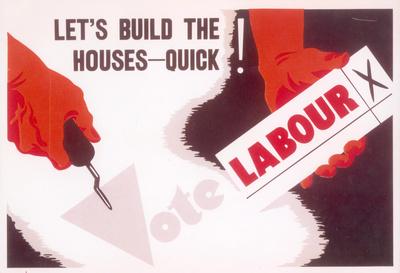
If last week was Labour’s “NHS week” then this week certainly seems to be the party’s “Housing week”. Yesterday the focus was on reform of the private rented sector (which produced a shrill and over the top reaction from the Tories). Today the focus is back on new homes and home ownership – with Miliband announcing plans to abolish stamp duty for the vast majority of first time buyers, as well as giving the them the first shot at new homes built in their local area.
I know a lot of young would-be buyers who would be delighted by this stamp duty pledge, as it potentially puts a home of their own a few thousand pounds nearer. And giving local people the first crack at new homes means we can build and rebuild our communities.
But a stamp duty offer could boost demand, when the housing crisis is one of supply. So without a significant increase in supply, the long term impact of such a tax cut may be to push house prices up.
But there’s also a significant step forward in Labour’s ambitions for housebuilding too. Whilst the party aren’t going quite as far I would like and promising at least one million homes will be built during the next Parliament, they are now committed to starting to build more than a million homes during the next parliament (so the difference is largely a question of timescale rather than numbers or ambition).
Now if there’s anything that I’m obsessional about when it comes to policy it’s probably housebuilding. Off the top of my head I’ve mentioned it here, here and here – but there are dozens of examples. Housing has become my hobbyhorse, because a decent home and a decent job for all should be the aim of every government but especially every Labour government. Delivering on those fundamentals is as close to politics has to a “silver bullet”.
Yet the housing crisis are country faces is acute and growing daily.
Few things have irked me as much as Labour’s ‘nearly but not quite’ pledge to build 200,000 homes a year by 2020 (which some thought implied a million homes yet actually made no such commitment). Not because it was a bad promise – it wasn’t – but because it was a touch timid in response to a crisis so vast in scope that demanded a bold response. Since that announcement (made at Labour’s 2013 conference) I’ve harped on about the need for a million homes to anyone and everyone who would listen – from Ed Miliband himself to anyone who was frankly daft enough to ask me what I’d like to see a Labour government do.
So of course I’m pleased by this announcement.
I’m frankly delighted that Miliband has upgraded Labour’s housing offer from 200,000 homes a year by 2020 to a pledge to have at least started on a million homes by the end of this Parliament. It means – in short – that a million much needed homes will be built. And whilst the gap between 200k a year by 2020 and a million may *only* turn out to be a hundred thousand or so homes in real terms, that’s a hundred thousand more people/couples/families who will have a place to call home. And that’s a wonderful thing.
But after cartwheeling around in delight, reality has to kick in. Because even million new homes over the next five years may not even be enough to stop the housing crisis.
So although Labour is now committed to a million homes, that just needs to be the absolute baseline. The plan now must be to exceed that target, and as quickly as possible. And to use every weapon at the nation’s disposal – the whole works: garden cities, community land trusts, brownfield sites etc – to achieve it. And what’s more, affordable housing needs to be a bigger part of tackling the crisis too. Miliband will commit to strengthening affordable housing obligations on developers and allowing the Future Homes Fund to invest in housing associations developing affordable homes. But the need for affordable homes – and homes for social rent – is probably greater than we can reasonably expect to be delivered through such reforms.
So I’m afraid as good as this announcement is – and it’s good – it’s not yet enough to solve the housing crisis. It’s the deposit, if you like, but there are decades of payments to come (like a mortgage – see what I did there?). But it’s a strong first step on the way to tackling one of the really great social ills of 21st century Britain – and one that hits more people (and young people especially) every year.
The fight for many more good homes must continue. But if Labour is elected on May 7th, we will be able to chalk Monday April 27th down as a day when a very significant and welcome pledge was made.
On that basis – today is a good day.
Here’s the full detail of what else Miliband will announce today:
1. Labour will offer zero stamp duty to first time buyers for all homes under £300,000 – benefiting around 9 in 10 first time buyers by up to £5,000.
Cost: £225 million a year.
Duration: First three years of the next Labour government
Funding:
- Tackling tax avoidance by landlords through a National Register of Landlords (predicted to generate £100m in additional revenunue)
- Increasing tax paid by holding companies that buy UK property on behalf of investors – the Annual Tax on Enveloped Dwellings – and raising stamp duty on foreign buyers from outside the EU by at least 3%.
- Cutting tax relief that rogue landlords get for repairs and upkeep when the properties they own are not up to the required standard.
2. First time buyers that have lived in an area for more than three years will have first call on up to half of all the homes built in their area. National planning policy will be altered to give councils the power to ensure local first time buyers have priority access to a share of the homes built.
3. Foreign buyers will be stopped from buying properties before they’re advertised in the UK
4. Council tax crackdown on empty homes and unused land. Labour will allow local councils to charge 100% more council tax on any homes that have been left empty for one year to discourage “buy to leave”, and charge developers council tax on proposed homes where land has been banked for five years without being built on. Developers who don’t build homes on land may also “lose it” if they don’t “use it” – meaning the land could be sold to an alternative developer.




More from LabourList
Greater Manchester mayor election: Andy Burnham reveals three key manifesto pledges in bid for third term
‘Labour should grasp the chance to secure EU visa deal for young workers’
‘How Labour could win a Milton Keynes majority for the first time in decades’